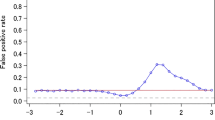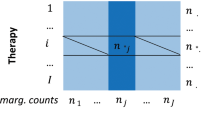Abstract
The data mining task we are interrested in is to find associations between variables in a large database. The method we have earlier proposed to find outstanding associations is to compare estimated frequencies of combinations of variables with the frequencies that would be predicted assuming there were no dependencies. The method we now propose use the same strategy as an efficient way of finding complex dependencies, i.e. certain combinations of explanatory variables, mainly medical drugs, which may be highly associated with certain outcome events or combinations of adverse drug reactions (ADRs). Such combinations of ADRs may also be recognized as syndromes.
The method we use for data mining is an artificial neural network architecture denoted Bayesian Confidence Propagation Neural Network (BCPNN). To decide whether the joint probabilities of events are different from what would follow from the independence assumption, the “information component” log(P ij /(P i P j )), which is a weight in the BCPNN, and its variance plays a crucial role. We also suggest how this method might be used in combination with stochastic EM to analyse conditioned dependencies also between real valued variables, e.g. to consider the amount of each drug taken.
Access this chapter
Tax calculation will be finalised at checkout
Purchases are for personal use only
Preview
Unable to display preview. Download preview PDF.
Similar content being viewed by others
References
A. Bate, M. Lindquist, I. R. Edwards, S. Olsson, R. Orre, A. Lansner, and R. M. D. Freitas, “A bayesian neural network method for adverse drug reaction signal generation,” European Journal of Clinical Pharmacology, vol. 54, pp. 315–321, 1998.
A. Holst and A. Lansner, “A higher order bayesian neural network for classification and diagnosis,” in Computational Learning and Probabilistic Reasoning (A. Gammerman, ed.), ch. 12, John Wiley & Sons, Ltd, 1996. Proc. of ADT, London, England, April 3-5, 1995.
R. Orre, A. Lansner, A. Bate, and M. Lindquist, “Bayesian neural networks with confidence estimations applied to data mining,” Computational Statistics and Data Analysis, pp.-, 1999. in press.
J. Pearl, Probabilistic Reasoning in Intelligent Systems: Networks of Plausible Inference. Morgan Kaufmann, San Mateo, 1988.
T. Koski and R. Orre, “Statistics of the information component in bayesian neural networks,” Tech. Rep. TRI0TA-NA-9806, Dept. of Numerical Analysis and Computing Science, Royal Institute of Technology, Stockholm, Sweden, 1998.
H. G. Tråvén, “A neural network approach to statistical pattern classification by “semiparametric” estimation of probability density,” IEEE Transactions on Neural Networks, vol. 2, no. 3, pp. 366–418, 1991.
R. Orre and A. Lansner, “Pulp quality modelling using bayesian mixture density neural networks,” Journal of Systems Engineering, vol. 6, pp. 128–136, 1996.
Author information
Authors and Affiliations
Editor information
Editors and Affiliations
Rights and permissions
Copyright information
© 2000 Springer-Verlag London
About this paper
Cite this paper
Orre, R., Bate, A., Lindquist, M. (2000). Bayesian Neural Networks used to Find Adverse Drug Combinations and Drug Related Syndromes. In: Malmgren, H., Borga, M., Niklasson, L. (eds) Artificial Neural Networks in Medicine and Biology. Perspectives in Neural Computing. Springer, London. https://doi.org/10.1007/978-1-4471-0513-8_32
Download citation
DOI: https://doi.org/10.1007/978-1-4471-0513-8_32
Publisher Name: Springer, London
Print ISBN: 978-1-85233-289-1
Online ISBN: 978-1-4471-0513-8
eBook Packages: Springer Book Archive




